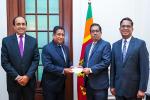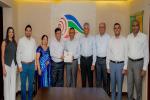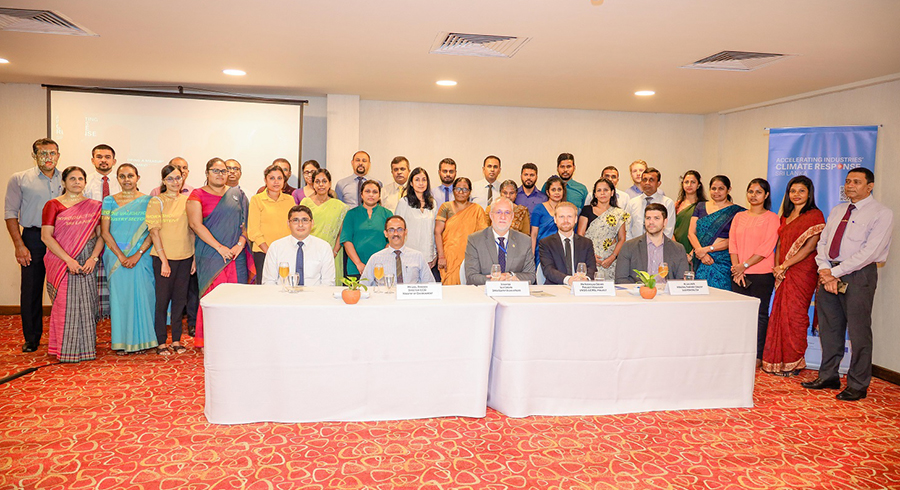It propels trade, generates jobs, and drives technological advances.
As Sri Lanka looks to its industries to drive economic recovery, it has also set its sights on decarbonizing the sector in order to meet its climate goals.
In a win for climate action, Sri Lanka has adopted a new monitoring system to map greenhouse gas (GHG) emissions from industries.
This is a major step towards meeting the national goal of cutting industrial sector GHG emissions by 7 per cent by 2030.
The establishment of the new measurement, reporting and verification (MRV) system was facilitated by the EU-funded Accelerating Industries' Climate Response in Sri Lanka project, which aims to support the industrial sector to decarbonize, and help Sri Lanka meet its commitment to combat global warming.
Led by the Ministry of Environment’s Climate Change Secretariat (CCS), the new MRV system is the result of a one-year collaborative effort involving public and private stakeholders, with the United Nations Industrial Development Organization (UNIDO) fielding international experts to provide technical support to this important process.
Now in place, it constitutes a robust monitoring arrangement that can track GHG emissions for energy use in manufacturing as well as in industrial processes and product use in line with global standards for accuracy and transparency.
The system also tracks the mitigation policies and measures in place for industrial processes and product use.
The Central Environmental Authority (CEA), Department of Census and Statistics (DCS), and Sri Lanka Sustainable Energy Authority (SLSEA) are working hand-in-hand with the Ministry of Environment to gather, refine, analyze, and report industrial emissions data.
Benefits for Sri Lanka and its industries
Once fully operational, the new MRV system will allow the government to formulate data-driven policies and well-informed strategies to reduce and remove GHG emissions, while aiding national planning and coordination.
Moreover, it means Sri Lanka is better able to meet domestic and international disclosure requirements, including reporting against Nationally Determined Contributions (NDCs) in line with the Paris Agreement.
The adoption of the system allows identification of emissions sources and trends within a variety of sectors and activities; enabling industries to roll out targeted improvements for energy efficiency, adopt better technology, and incorporate digitalization while ensuring continuous improvement.
Considering that Sri Lankan industry is one of the largest consumers of energy, constituting about 15 per cent of oil products and 33 per cent of electricity, these advancements could result in significant cost-savings against global fluctuations in energy prices.
Director at the Department of Census and Statistics (DCS) Udayakumary Kanapathipillai explained that the DCS Annual Survey of Industries is being enhanced by the MRV system, which would allow capturing environmental data and emissions information at a more granular level.
“The Department is looking to Sri Lanka’s industries to play their part in collecting and reporting environmental data, which benefits them and enables our country to make progress toward climate targets and the Global Goals.”
By equipping industries with the guidance, tools, and processes to better measure and report GHG emissions, the new system supports organizations in their climate goals and decarbonization journeys while helping them stay abreast of rapidly evolving global regulations and compliance.
As an internationally-recognized system with rigorous and verifiable data, the MRV system also enhances the credibility of businesses.
Thereby improving eligibility for new finance streams, technological support, or capacity building interventions.
Next steps for Sri Lanka’s industrial sector
With the system now designed and tested, over the next two years, the Climate Change Secretariat (CCS) and UNIDO are working in partnership with other stakeholders to support the roll out of the industrial MRV system.
A well-defined Industrial MRV system will go a long way toward helping Sri Lanka realize national ambitions to address climate change while unlocking new opportunities for the industrial sector.
Sri Lanka is well set to drive sustainable industry practices and achieve its ambitious targets; showcasing the pivotal role of MRV systems in global climate action.
Deputy Director of SLSEA, Gayathri Jayapala, noted how most industries across the island already have some measures in place for energy-saving, resource-efficiency and waste reduction.
“These entities are taking action to reduce energy consumption and mitigate emissions, thereby contributing to achieving Sri Lanka’s NDC targets.
We are working to increase awareness, align their efforts and streamline the data gathering process.
The onus now lies with business leaders and professionals to continue improving environmental practices in their operations and support reporting through the new MRV system.”






















